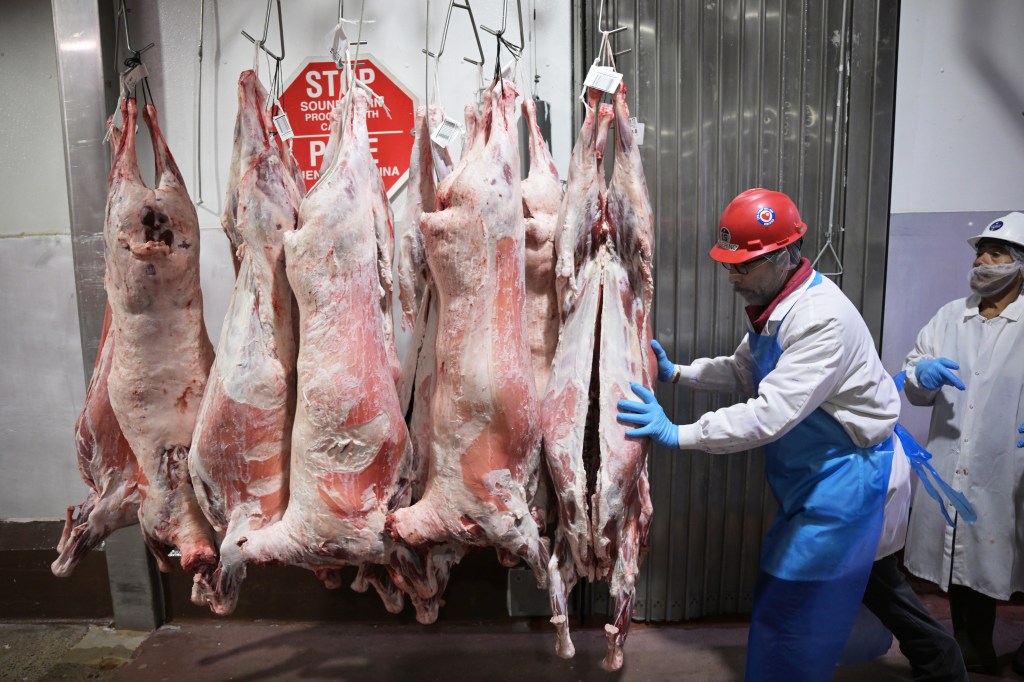Floors coated in blood. Cries of pain. A stench of death that lingers long after your shift. Several decades later, I’m still haunted by my job at Superior Farms’ lamb slaughterhouse in Denver. This November, voters will decide whether to shut it down thanks to Initiated Ordinance 309, which would ban slaughterhouses in city limits. As someone who’s walked those blood-soaked floors, I see a chance to wash away a stain on our city.
The systematic cruelty I witnessed all those years ago should shock the conscience of every voter. Lambs arrive packed together like cargo, eyes wide with terror. Electric prods move the lambs forward, burning wool and skin. Inside, lambs were hoisted upside down, kicking and thrashing. Then comes the knife, slicing throats — with eyes still blinking, still aware. That’s the kind of thing that sticks with you long after you’ve clocked out.
Someone has to wield that knife – over and over. Spending your day slitting throats, stepping in guts, ripping the skin from the spasming bodies of animals who were alive moments ago – it’s hard to go home to your family after that. I had never used drugs before, but cocaine would get me through 10-hour shifts while other drugs helped me numb out afterward.
It’s no wonder slaughterhouse workers face a well-documented and substantial increase in mental illness and substance abuse. Slaughterhouses have reported high employee turnover annually. The company touts an employee ownership benefit, but only after a vesting period that was 3 years when I was there. If an employee lasted that long, there’s no price tag for the toll it takes on their body and mind.
I got out of that job as fast as I could. A 2021 review by scholars from the University of Kent in Canterbury found evidence in another study that slaughterhouse employees do have an increased likelihood of committing crimes. While violent crime was not associated with the workers, an increase in sexual crimes was noted. The violence spills out beyond slaughterhouse walls, poisoning local communities. Globeville has an alarming crime rate. Banning slaughterhouses would go a long way towards healing the area.
The slaughterhouse’s corporate owners have a troubled history. Superior Farms was sued by a whistle blower and Animal Outlook in 2023 for routinely failing to stun lambs at a facility in California before slaughter, and the USDA joined the case. It resulted in a settlement agreement.
An employee in Denver sued in 2021 alleging racial and religious discrimination after muslim workers were fired for refusing to fraudulently certify meat as halal. The company has been fined $91,811 for labor violations in the last decade, and the EPA says the facility does allow contaminated water runoff into the Platte River, and has failed to properly report its pollution in recent years.
These violations reveal a pattern of disregard for animals and the local community. As a kid, I would ride my bike along the Platte, thinking the foul stench was just part of city life. Now I know better.
Each day at work, I watched over a thousand lambs thrown, punched, and stabbed through a deadly assembly line. I watched the feces from the holding pens wash into the river, where children played. This negligence would never be tolerated somewhere like Cherry Creek, but it’s just one more way the mostly Latino Globeville neighborhood has been left behind. Indeed, the slaughterhouse is one reason 80216 is considered the most polluted residential zip code in the country.
Working at the slaughterhouse almost set my life on the wrong course, and it breaks my heart when I see young people starting there. Initiated Ordinance 309 includes a provision to prioritize affected workers in Denver’s Green Jobs Program, providing workforce training and support in career transitions, funded by the $40M Climate Protection Fund. This is an incredible chance for workers to break free from the kill floor and move towards a future that doesn’t cost us our humanity.
As someone still haunted by the memories of my time there, I’m begging Denver to vote “yes” on Initiative 309 – for the animals, the environment, and our community.
Jose Huizar is a lifelong resident of Globeville. He formerly worked on the kill floor of the Superior Farms slaughterhouse in Denver.
Sign up for Sound Off to get a weekly roundup of our columns, editorials and more.
To send a letter to the editor about this article, submit online or check out our guidelines for how to submit by email or mail.
